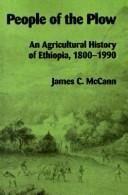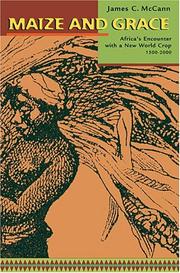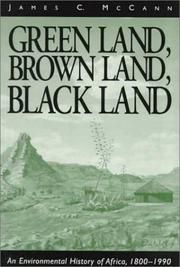| Listing 1 - 10 of 14 | << page >> |
Sort by
|

ISBN: 0299146103 0299146146 9786612622847 0585316511 0299176134 1282622846 9780299176136 9780585316512 9780299146108 9780299146146 9780299146108 Year: 1995 Publisher: Madison, Wis. University of Wisconsin Press
Abstract | Keywords | Export | Availability | Bookmark
 Loading...
Loading...Choose an application
- Reference Manager
- EndNote
- RefWorks (Direct export to RefWorks)
Agriculture --- Earth & Environmental Sciences --- Agriculture - General --- History. --- History --- Ethiopia --- Farming --- Husbandry --- Industrial arts --- Life sciences --- Food supply --- Land use, Rural

ISBN: 0674017188 9780674025578 0674025571 0674040740 9780674017184 9780674040748 0674265904 Year: 2005 Publisher: Cambridge, Mass. Harvard University Press
Abstract | Keywords | Export | Availability | Bookmark
 Loading...
Loading...Choose an application
- Reference Manager
- EndNote
- RefWorks (Direct export to RefWorks)
Sometime around 1500 A.D., an African farmer planted a maize seed imported from the New World. That act set in motion the remarkable saga of one of the world's most influential crops--one that would transform the future of Africa and of the Atlantic world. The recent spread of maize has been alarmingly fast, with implications largely overlooked by the media and policymakers. McCann's compelling history offers insight into the profound influence of a single crop on African culture, health, technological innovation, and the future of the world's food supply.
Corn --- History. --- Grain --- Breadstuffs --- Cereal grains --- Cereals --- Grains --- Corn plant --- Indian corn --- Maize --- Zea mays --- Zea --- History --- Botany, Economic --- Field crops --- Flour --- Food --- Food crops --- Seed crops
Book
ISBN: 0821445138 9780821421475 0821421476 9780821421468 0821421468 9780821445136 Year: 2014 Publisher: Athens, Ohio
Abstract | Keywords | Export | Availability | Bookmark
 Loading...
Loading...Choose an application
- Reference Manager
- EndNote
- RefWorks (Direct export to RefWorks)
Malaria is an infectious disease like no other: it is a dynamic force of nature and Africa's most deadly and debilitating malady. James C. McCann tells the story of malaria in human, narrative terms and explains the history and ecology of the disease through the science of landscape change. All malaria is local. Instead of examining the disease at global or continental scale, McCann investigates malaria's adaptation and persistence in a single region, Ethiopia, over time and at several contrasting sites. Malaria has evolved along with humankind and has adapted to even modern-day technological
Malaria --- History. --- Prevention. --- Ague --- Chills and fever --- Intermittent fever --- Malarial fever --- Fever --- Protozoan diseases
Book
ISBN: 9780896802728 Year: 2009 Publisher: Athens (Ohio) : Ohio university press,
Abstract | Keywords | Export | Availability | Bookmark
 Loading...
Loading...Choose an application
- Reference Manager
- EndNote
- RefWorks (Direct export to RefWorks)
Cooking, African. --- Food habits --- Food preferences --- Africa --- Social life and customs.
Book
ISBN: 9781512804409 Year: 2016 Publisher: Philadelphia
Abstract | Keywords | Export | Availability | Bookmark
 Loading...
Loading...Choose an application
- Reference Manager
- EndNote
- RefWorks (Direct export to RefWorks)
Book
ISBN: 9781849040365 9781849040358 Year: 2010 Publisher: London : Hurst and company,
Abstract | Keywords | Export | Availability | Bookmark
 Loading...
Loading...Choose an application
- Reference Manager
- EndNote
- RefWorks (Direct export to RefWorks)
History --- Prepared foods --- Human feeding --- Indigenous knowledge --- Africa
Digital
ISBN: 9781512804409 9780812280388 Year: 2016 Publisher: Philadelphia, Pa University of Pennsylvania Press
Abstract | Keywords | Export | Availability | Bookmark
 Loading...
Loading...Choose an application
- Reference Manager
- EndNote
- RefWorks (Direct export to RefWorks)

ISBN: 0325000964 0852557744 9780325000961 Year: 1999 Publisher: Portsmouth: Heinemann,
Abstract | Keywords | Export | Availability | Bookmark
 Loading...
Loading...Choose an application
- Reference Manager
- EndNote
- RefWorks (Direct export to RefWorks)
Sociology of environment --- Environmental protection. Environmental technology --- Third World: agricultural and food problems --- anno 1800-1999 --- Africa --- Environmental conditions --- History --- #SBIB:39A73 --- #SBIB:39A4 --- #SBIB:96G --- Etnografie: Afrika --- Toegepaste antropologie --- Geschiedenis van Afrika --- History. --- Developing countries: agricultural and food problems --- Eastern Hemisphere --- Africa - Environmental conditions - History
Book
ISBN: 0299316335 9780299316334 9780299316303 0299316300 Year: 2018 Publisher: Madison, Wisconsin
Abstract | Keywords | Export | Availability | Bookmark
 Loading...
Loading...Choose an application
- Reference Manager
- EndNote
- RefWorks (Direct export to RefWorks)
Historians and scholars of Ethiopia have long struggled to understand the "Ethiopian Paradox": that is, how could Africa's most productive food production system, which sustained an extraordinary imperial culture over two millennia, also be home to periodic, gut-wrenching famine and rural poverty? Ethiopia in the late twentieth century has surpassed earlier icons of famine: China, India, Armenia, and Biafra. And yet, ironically, Ethiopia's highland culture also generated, and eventually exported, the iconic cuisine served in Ethiopian restaurants throughout the developed world, and in large cities in Africa itself. Donald Crummey argues that in the face of increasing environmental stress, Ethiopian farmers have innovated and adapted. In the process they have developed effective strategies for managing their environment--strategies too often ignored by conservation projects.
Landscape changes --- Famines --- Agriculture --- Farming --- Husbandry --- Industrial arts --- Life sciences --- Food supply --- Land use, Rural --- Famine --- Starvation --- Change, Landscape --- Geomorphology --- History. --- History --- Environmental aspects
Digital
ISBN: 9780674040748 Year: 2009 Publisher: Cambridge, Mass. Harvard University Press
Abstract | Keywords | Export | Availability | Bookmark
 Loading...
Loading...Choose an application
- Reference Manager
- EndNote
- RefWorks (Direct export to RefWorks)
| Listing 1 - 10 of 14 | << page >> |
Sort by
|

 Search
Search Feedback
Feedback About UniCat
About UniCat  Help
Help News
News